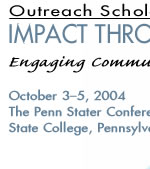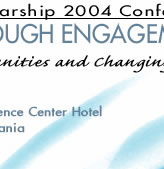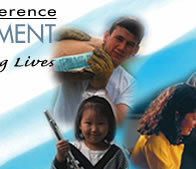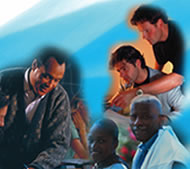Strengthening
Community Capacity through Partnership
Margaret
W. Miltenberger, Extension Assistant Professor,
West Virginia University
Realizing
outreach through true collaboration is a challenge.
Many lessons have been learned about maintaining partnerships
since the inception of Energy Express, a university-based
outreach strategy. Energy Express is a summer program
that promotes the school success of children. Evaluations
have consistently demonstrated high impact; partnerships
are key to its success.
Penn State Mega-Outreach: The PROSPER Project--Our Side
of the Story
Paul
V. Webster, Extension Educator, Youth Development,
Penn State Cooperative Extension in Potter County
Marianne Carrico, Instructional Support Teacher,
Fretz Middle School--Bradford Area School District
Carma Horner, Administrator, Alcohol and Drug
Abuse Services, Inc.
Lee Sizemore, Administrator, The Guidance Center,
Bradford Area School District
Brian Bumbarger, Research Associate, The Penn
State Prevention Research Center
This
session highlights the PROSPER Project in the Bradford
Area School District, an implementation site in North
Central Pennsylvania. Local collaborators will report
on their efforts to maximize community engagement for
science-based program success, sustainability, and replication.
Benchmark Standards for Engagement Across the Mission:
Dilemmas Provoked by Intra and Interinstitutional Diversity
Hiram
E. Fitzgerald, Assistant Provost, Michigan State
University
Steven F. Schomberg, Vice Chancellor, University
of Illinois, UC
Trever R. Brown, Dean, Indiana University
Chet D. Rzonca, Dean, University of Iowa
John C. Burkhard, Professor, University of Michigan
Victor Bloomfield, Interim Dean, University of
Minnesota
Bobby D. Moser, Vice President, Outreach and
Engagement, Ohio State University
Craig D. Weidemann, Vice President for Outreach,
Penn State
Don K. Gentry, Vice Provost for Engagement, Purdue
University
Howard Martin, Associate Vice Chancellor, University
of Wisconsin-Madison
The
workshop is devoted to a discussion of the CIC Committee
on Engagement's approach to establishing benchmarks
for institutional assessment of the impact of engagement.
Participants will be presented with framing information
(definitions, models) and then will engage in a facilitated
discussion related to the generation, assessment, and
implementation of benchmarks across institutions.
Using the Logic Model to Assess Medium Term Impacts
of a Regional Leadership Development Education Program
Dan
Hill, Local Government Specialist, University of
Wisconsin-Extension
Tim Filbert, Community Resource Development Educator,
University of Wisconsin-Extension
Paul Ohlrogge, Community Resource Development
Educator, University of Wisconsin-Extension
Assessing
participant satisfaction and measuring achievement of
learner objectives are established components of most
leadership development programs. But, how can program
planners "know" what the longer-term impacts
of their programs are? The Community Leadership Alliance
of Southwest Wisconsin program planners will share their
experiences with practical ways of assessing the impact
of leadership programs.
Impacting Pennsylvania's Children through Establishment
of a Statewide Child Support Enforcement Training Institute
Jennifer
A. Mastrofski, Associate Professor, Penn State
Roy H. McCullagh, Senior Project Associate, Penn
State
Thomas H. Sheaffer, Director, PA-DPW, Bureau
of Child Support Enforcement
Stuart I. Jackson, Director, Huntingdon County
Domestic Relations Section
The
Pennsylvania Child Support Enforcement Training Institute
at Penn State demonstrates how educational institutions
can and must be flexible to meet community needs. It
exemplifies how university, county, and state partners
can achieve comprehensive training needs within a complex
organizational environment.
National Youth Development Online Evaluation System
Claudia
C. Mincemoyer, Assistant Professor, Penn State
Daniel Perkins, Associate Professor, Penn State
Learn
about a newly developed online resource and process
that provides program evaluation information to 4-H
Youth Development educators. The system was collaboratively
developed by Purdue and Penn State Universities. The
session will demonstrate the online resource and evaluation
tools.
The Metamorphosis of Pennsylvania's P/K-16 Councils
Sandi
Sheppeard, Assistant Director/PA Academy, State
System of Higher Education
Through
a multimedia presentation, participants will learn the
structure of Pennsylvania's P/K-16 councils, the benefits
and challenges of working P/K-16, how to become a part
of the P/K-16 network, how to expand outreach activities
through P/K-16 Councils, and how we have funded the
work of the P/K-16 Councils.
Students in Orbit: Creating Learning Experiences
from Space
Jim Pawelczyk, Associate Professor of
Physiology and Kinesiology, Penn State
Adena Williams Loston, Associate Administrator
for Education, NASA Headquarters (invited)
Bringing scientific discoveries to American classrooms
is critically important if we hope to inspire future
generations to become scientists. This panel of former
astronauts and NASA representatives brings together
higher education, space exploration, and scientific
discovery to address our mission for K-12 science education.
Service Learning as Community-Based Scholarship
Jeremy
Cohen, Associate Vice Provost for Undergraduate
Education and Professor of Communications, Penn State
Golden Jackson-Mergler, Associate Professor,
Ohio State University
Carie Goral, Director, Wisconsin K-16 AmeriCorps*VISTA
Service-Learning Project, Wisconsin Campus Compact
Patricia (Trish) Kalivoda, Associate Vice President
for Public Service and Outreach, The University of Georgia
Service
learning, a form of experiential education, connects
student participation in an organized service activity
with specific learning outcomes, meets identified community
needs, and provides structured time for student reflection
on the connections of service and learning. The integration
of community-based service into the academic curriculum
affords opportunities for interdisciplinary research
that contributes to societal well-being, distinctive
educational experiences for undergraduates, and development
of authentic partnerships and collaboration with the
diverse community of the university. Faculty from all
four of the partner universities will discuss models
to support development of service learning and evaluation
of the outcomes.
Engagement
at Urban Comprehensive Universities--Can Non-Land Grants
Play . Perhaps Better?
Phillip
Gaunt, Professor and Director of WSU-LINK,
Wichita State University
Lorilee Sandmann, Co-director of the Clearinghouse
and National Review Board for the Scholarship of Engagement,
and Associate Professor of Adult Education, The University
of Georgia
One
could argue that the role of the land-grant university
and the concept of the university in engagement are
well defined and accepted. What about the comprehensive
institution? Does the agricultural tradition of the
early outreach movement preclude urban universities
from being seen as important players in the community-university
connection? This workshop will feature an early look
at research findings that describe how urban comprehensive
institutions are now zealously embracing outreach. It
is expected that an open-discussion session will stimulate
participants to consider how best to position their
institutions in the engaged university movement, even
if that has not been their tradition.
|





